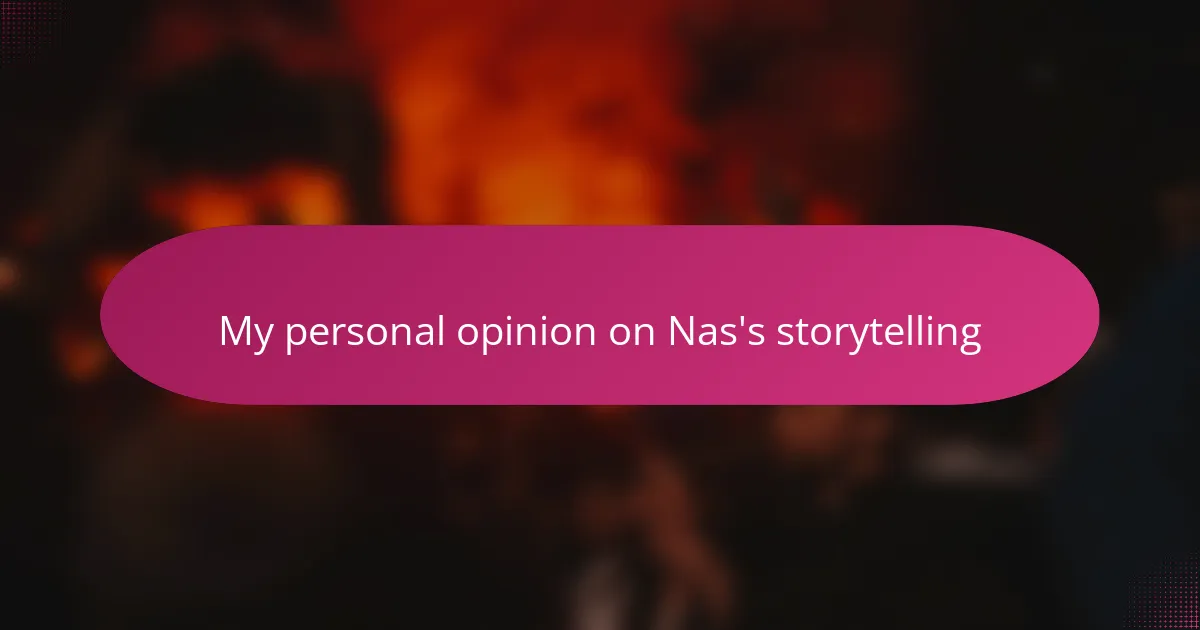Key takeaways
- Storytelling in rap, especially by artists like Nas, is about creating vivid, relatable experiences that resonate with listeners on a personal level.
- Nas’s style combines detailed imagery with emotional honesty, offering both personal reflections and broader social commentary without sounding preachy.
- His influence has set a high standard in rap culture, encouraging artists to explore deeper narratives that intertwine personal experiences with societal issues.
- Effective storytelling in rap writing involves embracing specific details, balancing personal vulnerability, and using rhythm to enhance the narrative impact.
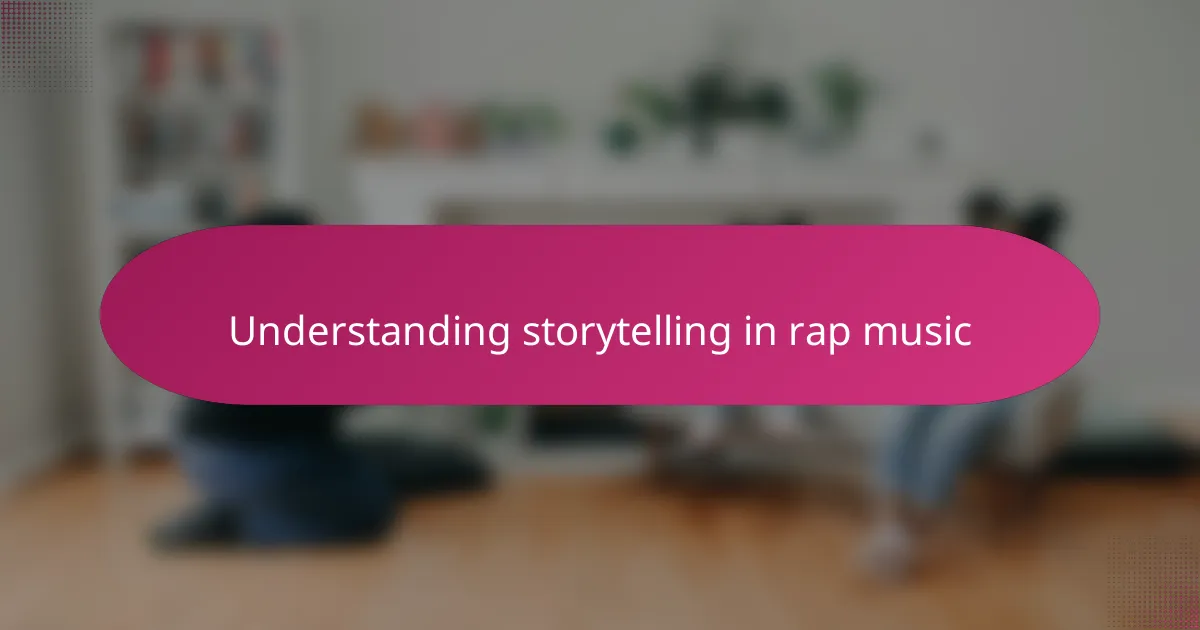
Understanding storytelling in rap music
Storytelling in rap music isn’t just about rhyming words; it’s about painting vivid pictures with lyrics. I remember the first time I really listened to a rapper narrate a story—it felt like I was living their experience, walking in their shoes. Have you ever noticed how some verses stick with you long after the song ends? That’s the power of a well-told story.
What fascinates me is how rap artists use everyday language to convey complex emotions and situations. It’s raw and real, often reflecting struggles, triumphs, or moments of reflection. This grounded approach makes the storytelling relatable, almost like a friend sharing their life with you.
Does the pace or tone of the flow affect how the story hits you? I think it does. A slower, deliberate delivery can make every word weigh heavier, while a rapid-fire verse might mirror chaos or excitement. These nuances show how storytelling in rap isn’t just about the words but how they’re rhythmically brought to life.
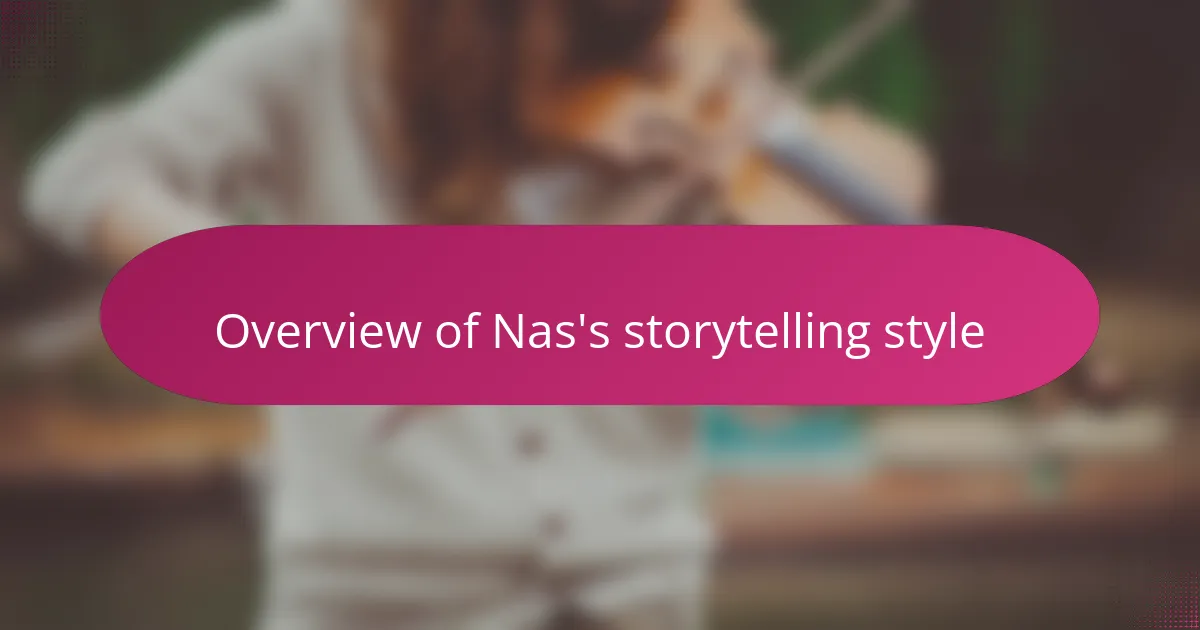
Overview of Nas’s storytelling style
Nas’s storytelling style has always struck me as deeply authentic and cinematic. He doesn’t just tell a story—he invites you into the scene, almost like you’re right there with him in Queensbridge, feeling every moment. Have you ever felt that kind of raw, immersive storytelling that makes you pause and reflect?
What I find remarkable is the way Nas blends vivid imagery with a conversational tone. His stories aren’t distant tales; they feel lived-in and personal, like he’s confiding in you. This approach makes his narratives both powerful and relatable, even years after I first heard them.
Sometimes, his flow slows down just enough to make you catch every detail, every emotion behind the words. I remember listening to “One Love” and feeling like I was reading a heartfelt letter rather than just a rap verse. That’s the kind of storytelling skill that sets Nas apart in my opinion.
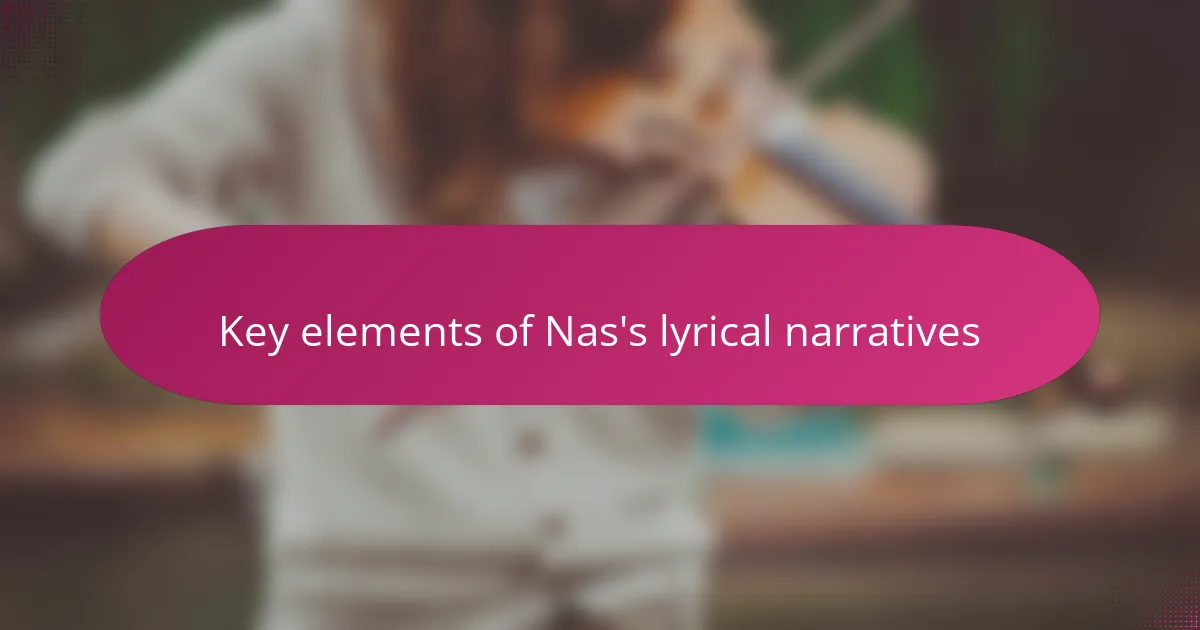
Key elements of Nas’s lyrical narratives
What stands out most to me in Nas’s lyrical narratives is his attention to detail. He doesn’t just sketch broad strokes; he zooms in on the small moments that make a story real—like the crackling sounds of a Queensbridge street corner or the subtle emotions behind a fleeting glance. Have you ever caught yourself replaying a line because it painted such a clear picture? That’s Nas’s magic at work.
Another element I find compelling is how Nas weaves moral and social commentary into his stories without sounding preachy. His verses make you think about the world around you while still feeling deeply personal. It’s like he’s having a conversation with you, asking tough questions but also sharing his own struggles. This balance keeps me hooked every time.
And let’s not forget the flow—the way Nas uses rhythm to match the mood of his story. Sometimes it’s smooth and reflective, other times urgent and sharp. I remember listening to “Rewind” and being amazed at how the backward storytelling flow made the narrative even more gripping. It shows how technically skilled Nas is, shaping his lyrics and delivery to serve the story perfectly.
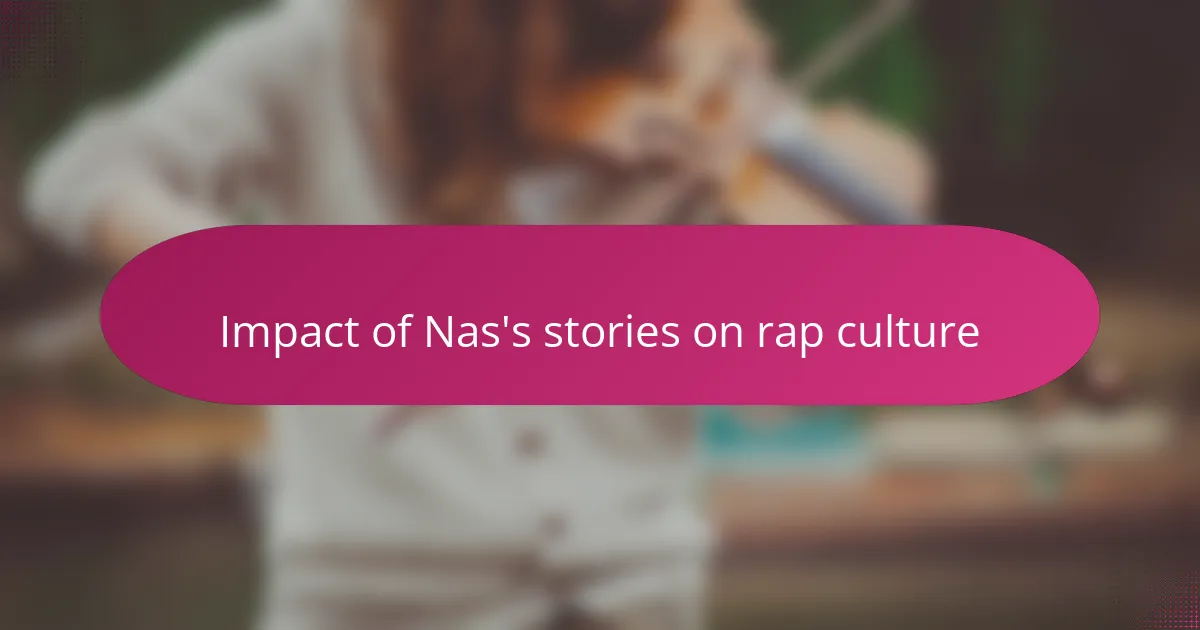
Impact of Nas’s stories on rap culture
Nas’s storytelling has left a lasting imprint on rap culture by raising the bar for lyrical depth and authenticity. Whenever I hear young rappers today trying to capture that raw, unfiltered slice of life, I can see Nas’s influence shining through. His ability to merge personal experience with broader social themes set a new standard that many artists still strive to reach.
It’s fascinating to me how Nas’s narratives don’t just entertain—they educate and inspire. I recall moments when hearing his stories made me pause and reconsider the power of words in shaping perspectives, especially within communities that rap often represents. How many rappers can make you feel both the weight of history and the pulse of the streets at the same time?
What really stands out is how Nas’s impact goes beyond just music—it’s cultural storytelling that has expanded what rap can be. His influence encouraged a generation to dig deeper, to tell stories that matter, and to push the genre into a space where artistry and message coexist seamlessly. Hasn’t that made rap richer and more meaningful in your view too?
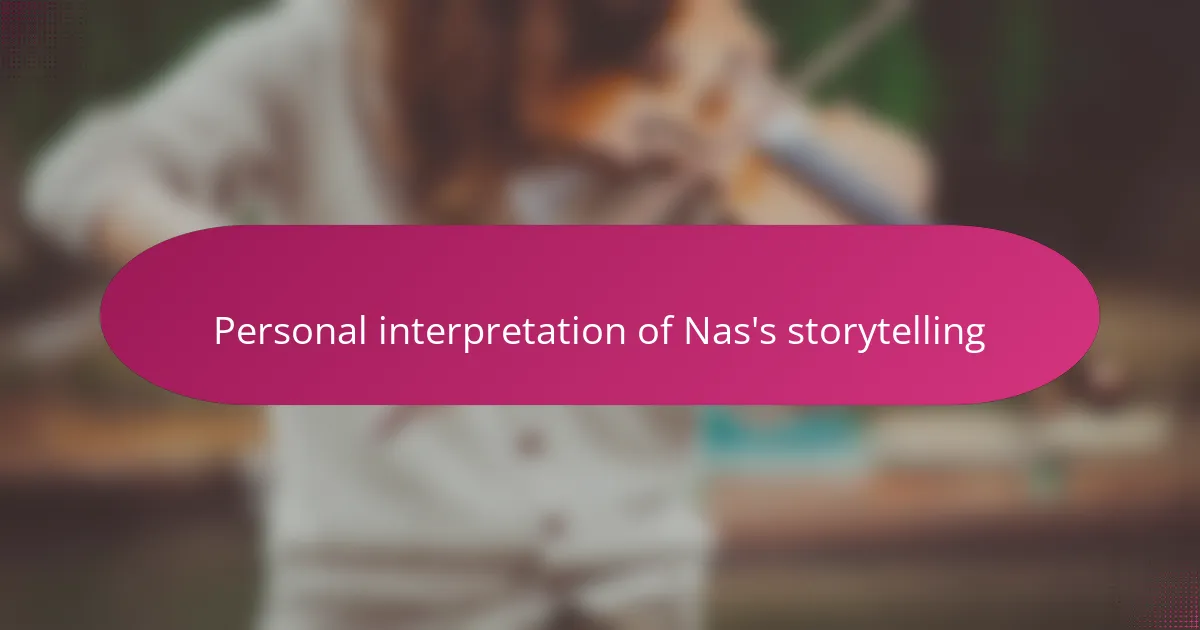
Personal interpretation of Nas’s storytelling
When I think about Nas’s storytelling, what really hits me is how effortlessly he bridges the gap between the personal and the universal. It’s like he’s sharing a piece of himself, but in doing so, he opens a door for me to reflect on my own experiences. Have you ever listened to a verse that felt like a mirror to your own thoughts, even though it’s someone else’s story? That’s the kind of connection Nas builds with his listeners.
I also find myself drawn to the emotional honesty behind Nas’s narratives. There’s a vulnerability there that doesn’t come across as weakness but as strength—like he’s unafraid to show his flaws and struggles. This rawness makes the stories linger with me long after the track ends, almost like a conversation with a trusted friend who’s telling it like it is.
What fascinates me most is how Nas’s storytelling invites patience and attention. Sometimes you need to pause and let the words settle, to catch those nuanced emotions hidden in his flow. I remember replaying lines from “Dance” again and again, each time uncovering a deeper layer. Isn’t that the mark of great storytelling—when it rewards you the more you listen?
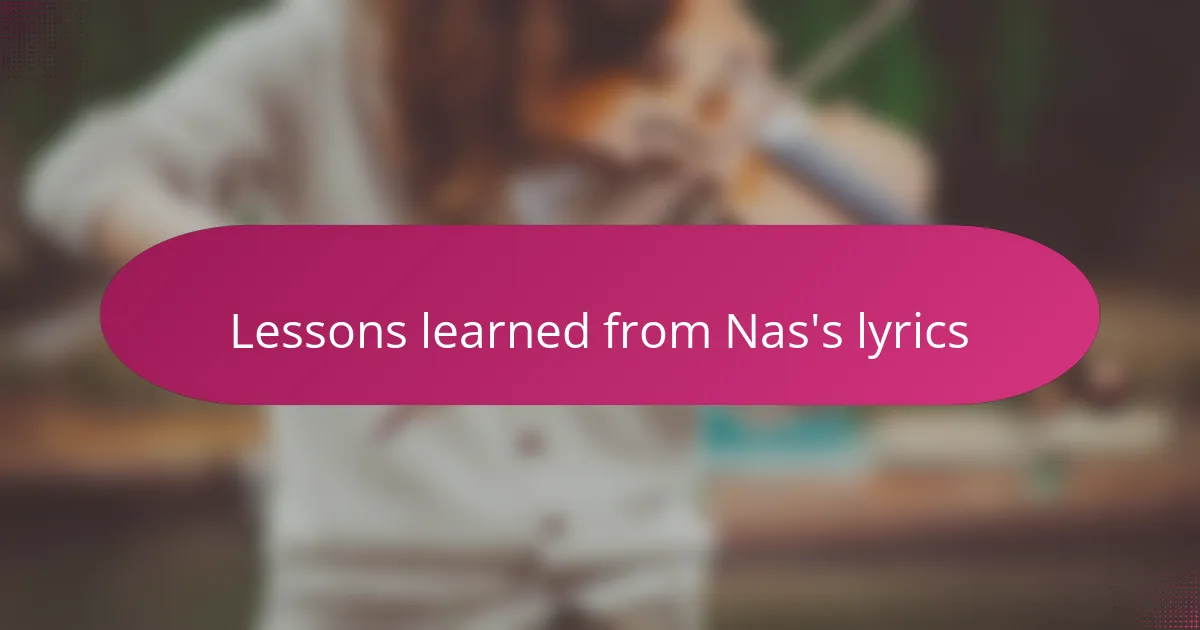
Lessons learned from Nas’s lyrics
There’s a lesson in every Nas verse that hits close to home. From my experience, his lyrics taught me that storytelling isn’t just about recounting events—it’s about capturing the emotions underneath them. Do you ever find yourself moved not just by what he says, but how he makes you feel like you’re living that moment with him?
One thing I’ve learned from Nas is the power of honesty and vulnerability in storytelling. I remember a time when his raw depictions of struggle made me rethink my own perspective on resilience. It’s like he’s saying, “This is real life, with all its pain and triumph,” and that authenticity is what makes his stories unforgettable.
What continually strikes me is how Nas uses his lyrics to provoke thought and spark self-reflection—without ever coming across as preachy. Have you noticed how he can drop a social insight wrapped inside a personal tale, making you question the world and your place in it? That balance between insight and intimacy is, in my opinion, what makes his storytelling truly timeless.
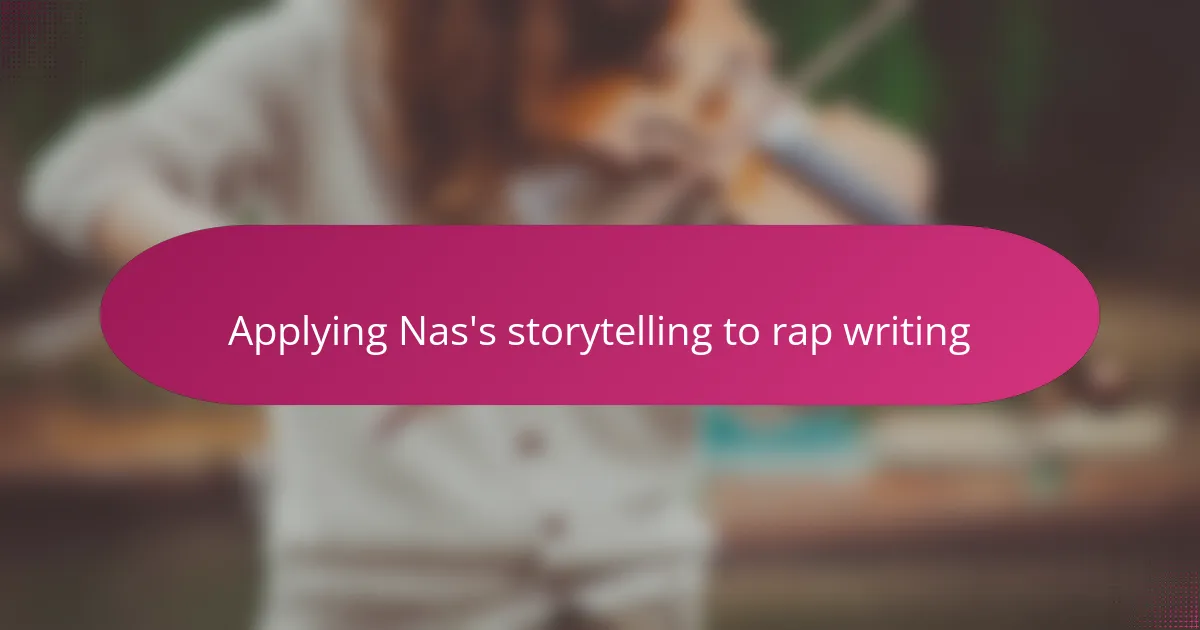
Applying Nas’s storytelling to rap writing
Applying Nas’s storytelling to rap writing means embracing detail and honesty above all. From my experience, focusing on the small, specific moments—like Nas’s vivid street scenes—can transform a generic verse into something alive and gripping. Have you ever tried zeroing in on one tiny scene to make the whole story pop? It works like a charm, giving listeners a way in that feels authentic, not forced.
What I find invaluable is how Nas balances personal vulnerability with larger social truths. Trying this approach in my own writing, I realized that sharing struggles openly doesn’t weaken a story; instead, it builds trust and deepens the message. Do you think honesty in storytelling can sometimes be uncomfortable? For me, pushing through that discomfort has led to some of my most powerful verses.
Flow and rhythm are also crucial tools in applying Nas’s style. I’ve noticed that adjusting the pace to match the mood—slowing down for reflection, speeding up for intensity—makes the story hit harder. Nas’s use of tempo isn’t random; it’s deliberate and shapes how you feel every word. Have you experimented with flow this way? It’s a game-changer that adds another layer of meaning to your lyrics.
